Alejandro Escovedo’s amazing musical journey has taken him from being a founding member of early San Francisco punk rock band The Nuns, to the cow-punk pioneers Rank and File, to the rockin’ True Believers, to an acclaimed solo career which has explored various sounds and earned him the title Artist of the Decade for the 1990’s from the alt-country publication No Depression. His latest album, Burn Something Beautiful, came out last year, and was a collaboration with Peter Buck from R.E.M. and Scott McCaughey from The Young Fresh Fellows and Minus 5.
This interview was for a preview article for noozhawk.com for Alejandro Escovedo’s concert at the Lobero Theatre on 2/25/17, as part of the Sings Like Hell concert series. (Nancy Rankin Escovedo photo)
Jeff Moehlis: What can people look forward to at your upcoming show?
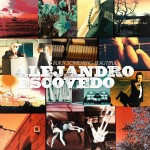
Alejandro Escovedo: There will be a lot of songs off my new record Burn Something Beautiful. I have an amazing band with me. I have Jason Victor on guitar, who plays with Steve Wynn and the Dream Syndicate, and then I have Shawn Peters who’s a drummer who has played with the Riverboat Gamblers, and then I also have Aaron McClellan on bass who has played in Midlake and various other bands around Denton, Texas. So I have a really strong band.
At my shows, it’s really always quite different. Every show’s different, but I think that what we can expect is going over the whole catalog, and taking things from earlier material up until the last album. There’ll be a little bit of everything.
JM: Speaking of your new album, how did your approach to that album differ from your other recent albums?
AE: You know, first of all it’s been four years since I put out a record, right? And in those four years, a lot of stuff happened. My wife Nancy and I were in a hurricane, a Category 4 hurricane, on our honeymoon, so that led to something called PTSD. That postponed the record a while back, about three years ago, I think it was. We were actually about to make the record, and had to cancel a tour because I was getting these brain seizures as a result of PTSD, and so we postponed the tour and postponed the making of the record. I also moved from Austin to Dallas, Texas, which was a big move for me. I’d been in Austin for so long. And also, I rid myself of hepatitis C, so that was pretty major.
So all those led to the making of the record, but I think that because of the experiences, and also collaborating with Peter Buck and Scott McCaughey led to a different approach to writing, and really just different things to say as a result of that also.
JM: I know that Peter and Scott helped to write the songs. Anything else that was special that they brought to the album?
AE: Everything they brought was special. Because of the way that they kind of co-wrote the record with me, we really built the record together even though it was kind of my story sometimes. But it’s also their stories, it’s our stories, that make up the songs on the records. And because they are also in the band, it has more of a band feel than it did being produced by somebody. So, they were in the studio when we were cutting the record, they were there through every mix, when they mixed the record they were there for that. So, I think having them on board made me feel like I was just kind of making a record with two bandmembers. It felt like a band. It felt very close – we were very familial.
JM: There are a lot of great songs on the new album. One that jumped out at me was “I Don’t Want to Play Guitar Anymore”. What’s the story behind that song?
AE: That’s the song that Peter brought initially. We all worked on it, but Peter brought it initially. Obviously, it’s written in a dark period. But the way I related to it was it related to a period of time when I was very ill with hepatitis C. There was a period of time when I didn’t play my guitar for a year. So I was thinking about those days, and how bleak they felt, and that if someone was to take away the ability to play guitar from me, what that would feel like, and the sense of loss that I would feel as a result of it. Like, when it says, “When there’s no stories left to tell, at the end of everything”, I think it’s about, like, if someone were to take away that ability to tell those stories, write those songs, sing those songs and play them, it would be pretty difficult to find out who exactly you are.
JM: If you don’t mind going way back, I want to ask you about The Nuns. How did that band fit into the San Francisco music scene at that time?

AE: Well, there wasn’t much of a scene before The Nuns. I remember we were trying to make a movie first. We wanted to be filmmakers, my friend Jeff [Olener] and I, who was a singer in The Nuns. So we were trying to make a movie about the worst band in the world, and since we couldn’t play we became the band in the movie. The movie was supposed to be about this Stooges-like band, but a band that really couldn’t play, that wasn’t great like The Stooges. The movie was called 18 1/2. The premise of the story also was that rock and roll music should only be made by teenagers, so this guy is running out of time, you know?
So we became the band in the movie, and then suddenly we just kind of became this band. We had no idea what we were doing. We really didn’t know how to play, we didn’t know how to write songs. But we started just making up these crazy songs, you know? And I remember Jennifer Miro heard us in Marin County, and she decided to join forces with us.
And then we started looking for gigs in the city, and there were no gigs, because it was mostly owned by Bill Graham and all those kind of people. So either you played the Old Waldorf or the Boarding House… There were just these mid-sized showcase venues. So we actually went to North Beach and went up to this Filipino restaurant called Mabuhay Gardens, and we heard that they had rock and roll bands in there. The only band that played there was this band called Mary Monday. I think she had played there before us. But, anyway, we told the owners Ness Aquino and Dirk Dirksen that we could draw thousands of people, of course. And we’d never even really played a gig, you know?
What we did was we had a show at Fisherman’s Wharf, and it was supposed to one of those places where the band plays in the window so that customers will come into the club, or the restaurant, or the bar, whatever it was. We actually got through about half of a song before he pulled the plug on us. So we put a sign up on the door saying, “If you want to see The Nuns, come to our rehearsal space on Folsom”. And the only people that showed up to our rehearsal space were Chip and Tony Kinman from The Dils. So we asked them if they wanted to do a show at the Mabuhay, and we made up these tickets, and we even misspelled The Dils – we put two l’s on the ticket. But we would just hand them out to everyone that we thought was interesting in North Beach, and at that time there were a lot of very interesting people. So we put on a show, and that began kind of the Mabuhay scene, and the North Beach scene. The Nuns became kind of a big band in San Francisco.
JM: The Nuns opened at the Sex Pistols’ final performance. What are your reflections on that evening?
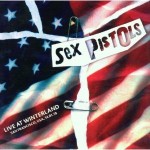
AE: Well, I think I was one of those people who really had bought into the rock and roll religion, and I just ate it all up, all the magazines, the fanzines, the bands, everything that was happening. That night, I saw a different side of rock and roll, maybe more of the industry, you know, and what a scam it was. To me, the facade had been broken. It was just like every other big rock show. It was kind of a circus. The Sex Pistols were in real bad shape. I don’t know, suddenly there was like Penny Frampton [McCall?] backstage, people like that. So it was very different. It was kind of disappointing.
JM: That kind of brings up a famous question from that evening, when Johnny Rotten said, “Ever get the feeling you’ve been cheated?”
AE: And I think that that’s kind of what I felt. I felt, in a way, like it had let me down, and I suddenly saw the guy behind the curtain, you know? It all was exposed suddenly. You have to remember that that was the end of punk rock as we knew it, and the beginning of a new type of more male-dominated, testosterone-fueled punk rock that was more from the suburbs. That’s when bands like the Dead Kennedys and Black Flag and all those bands started to be more prominent, what they called hardcore.
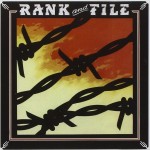
JM: You mentioned the guys from The Dils, and of course after The Nuns broke up you teamed up with them for Rank and File. What was the philosophy of that band when it started? What were you guys going for?
AE: I think we were one of those bands that was really just listening to our record collection and wanting to find something new to play, that wasn’t pigeonholed into the punk rock genre, if you will. I think we wanted to express ourselves in a lot of different ways. The records that we were listening to weren’t just punk rock, but all the things that kind of inspired punk rock, everything from Johnny Cash and Waylon Jennings to Joe Higgs and Big Youth and Tapper Zukie, all the different kinds of dub and reggae and country music and rock music that we loved. Just trying to meld everything together.
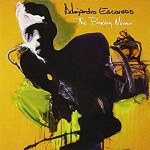
JM: Back to your solo career. I really like your album The Boxing Mirror, and I’m a huge fan of the Velvet Underground. What was it like working with John Cale on that album?
AE: It was an amazing experience, because I love the Velvet Underground. That was my band when I was growing up, you know? I was really taken by how he had a lot of concern for the making of the record. It was the first record I made after I was really ill with hepatitis C. He really took his time with me, was very patient, and also very caring. I think that we made a really interesting record. It’s one of my favorites. I wish I could make it again, just because I feel better now. I wasn’t feeling so great, but I think that’s part of why that record’s so special.
You know, John was just an amazing person to work with. The making of that record was interesting, because when I got to Los Angeles to make the record, we spent probably a week or two in the studio by ourselves. He would sit right across the piano from me, and I would play guitar and he would just kind of impressionistically start playing along with me. Some of those sessions were some of my favorite. I wish we had that on record. They were amazing times. It was an incredible record to make. John’s one of my favorite people, and certainly one of my most revered musicians.
JM: What advice would you give to an aspiring musician?
AE: I think it’s just really important to be positive. You have to have such a commitment and a focus to what it is you want to do, and love that goes beyond any sort of setback that you may find. And there’s going to be plenty of them along the way. So, I think that once your focus and your drive is centered on making music, and solely on making music and expressing yourself in a way that is individualistic and personal, then I think you’re fine. Once you create that sound and that space that is totally yours, no one can deny you. Because it’s just yours. So you can’t be judged against anything. And there’s going to be a lot of people that are going to tell you that what you do is not worth it, or not as good, or they don’t hear it, or whatever it is. So you just have to be determined to not listen to those people, and to follow your own voice. I think once you establish that, no one can deny you. But it takes a lot of strength, it takes a lot of will. It’s kind of like centering yourself and setting yourself up against a storm of some kind. You have to be determined to survive.
JM: You’ve worked with a lot of interesting people over the years. On the latest record there’s Peter Buck and Scott McCaughey, and you talked about John Cale. Another name that jumped out at me is Tony Visconti on your last few albums before this one. What was it like working with him? How was he as a producer?
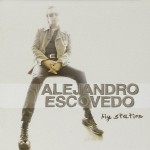
AE: He’s a master. It’s like working with a master. He’s so musical of a person, and he’s created some of the greatest rock and roll records of our era, of any rock era really. So he was there.
I think what he brings to it is not just a wisdom from a historical perspective, but that sense and that need to constantly be creating new things. And so what he brings out in you, and what is the gift of a really great producer, is when they inspire you in a way that you’re not even aware of. Where you suddenly are producing things that you weren’t even aware that you were capable of. And I think that Tony brings that in a very wonderful way.
And he can be very vocal. He can just kind of shut something down with a mere sentence, and say, “No, that’s not happening” for whatever reason. Then again he can listen to you and understand what it is you’re trying to do, and maybe you don’t know how to articulate it or execute it, but he’ll help you find a way to do it. So I love him for that.

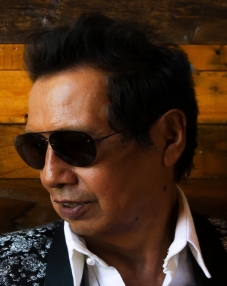
Discussion
No comments for “Interview: Alejandro Escovedo”